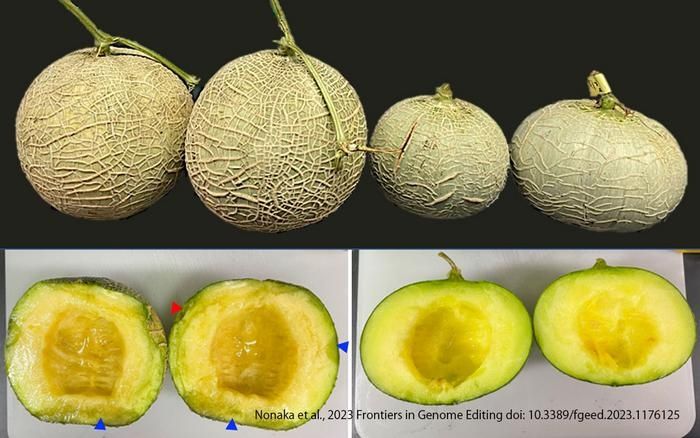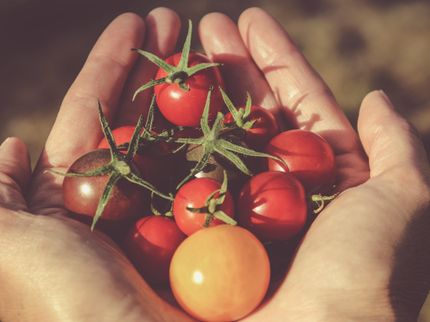Modifying shelf-life of melons via gene editing
The gaseous plant hormone ethylene has been long known to promote fruit ripening and play a certain role in shelf-life. In this study, the researchers performed gene editing using the (Clustered Regularly Interspaced Short Palindromic Repeats (CRISPR)/Cas9 system via modification of the ethylene synthesis pathway in the Japanese luxury melon (Cucumis melo var. reticulatus "Harukei-3") to increase its shelf-life.

Melon fruits 14 d after harvest (stored at 25°C)
University of Tsukuba
The enzyme 1-aminocyclopropane-1-carboxylic acid oxidase (ACO) is associated with the final step of the ethylene production pathway and has multiple homologous genes. The research group has previously demonstrated five CmACO genes (homologous genes of ACO) in the melon genome and shown that the CmACO1 gene is predominantly expressed in the harvested fruit. Therefore, we expected that CmACO1 would be an important gene for enhancing the preservation of the melon fruit. In this study, we selected CmACO1 as a target of gene editing and attempted to introduce mutations in the gene. Consequently, the harvested melons exhibited no foreign genes and the mutations induced were inherited for at least two generations. In the non-gene-edited line (wild type), ethylene generation was observed in the fruit 14 days postharvest, the rind turned yellow, and the flesh softened. However, in the genome-edited mutant, ethylene generation was reduced to one-tenth of that in the wild type, with the skin color remaining green and the fruit remaining firm. This indicates that introducing CmACO1 mutation via gene editing enhanced the shelf life of the melons. The results of this study indicate that gene editing can contribute to food loss reduction and improve food security.
Original publication
Other news from the department science

Get the food & beverage industry in your inbox
By submitting this form you agree that LUMITOS AG will send you the newsletter(s) selected above by email. Your data will not be passed on to third parties. Your data will be stored and processed in accordance with our data protection regulations. LUMITOS may contact you by email for the purpose of advertising or market and opinion surveys. You can revoke your consent at any time without giving reasons to LUMITOS AG, Ernst-Augustin-Str. 2, 12489 Berlin, Germany or by e-mail at revoke@lumitos.com with effect for the future. In addition, each email contains a link to unsubscribe from the corresponding newsletter.




























































